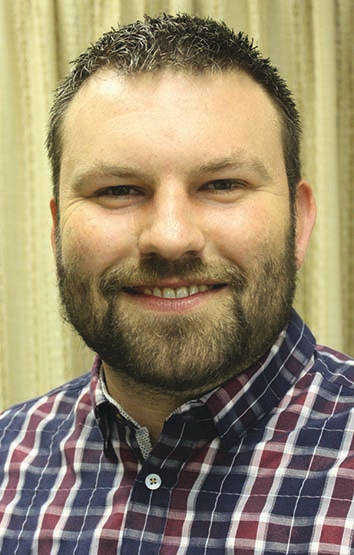Extension office welcomes incoming county educator

Brad Stokes is known in some circles as the "bug guy." Not only can he quickly identify the name of a specific insect or spider, he can trace these organisms down to their specific species and subspecies.
It's a calling he never expected to explore during his time at the College of Idaho in Moscow. He admits that it happened quite by accident.
As the incoming educator with the University of Idaho's extension office in Mountain Home, it's a skill that will allow him to help farmers, gardeners and others in the county improve their agricultural pursuits, whether it's creating an award-winning flower garden or yielding a bumper crop of potatoes, sugar beets or alfalfa.
Stokes fills the seat at the extension office previously held by Dr. Mir-M. Seyedbagheri, who served as an educator with the county agency over the past 32 years before he retired last summer.
"I'm here to help the community," he said. "I'm here to answer questions about water, soil, plants, insects, disease and pathogens. I'm here to be a finger of the hand of the University of Idaho."
Looking back over the path he chose, Stokes said he started that journey back in 2009 when he earned his bachelor's degree in horticulture, or plant science, from the University of Idaho's campus in Moscow. Earning his degree at a time when the job market was extremely limited following the housing market crash and subsequent recession, he decided to return to school to continue his studies.
He focused on entomology, or the study of insects, due to his previous research project involving a species of gray beetles. That work convinced him to remain in this field.
Once he was accepted into the university's graduate program, he quickly fell in love with collecting and cataloging insects.
"The idea that everything out there has a specific name and trying to figure out that mystery just clicked in my brain," he said. "Putting two specific Latin words together, finding their entire history, their life cycle, what they feed on... and the interactions with other organisms is just mind boggling," he said.
The one thing that Stokes wants to correct is a perception that all insects are pests. All of them not only play an important part in the ecosystem, but each one plays a specific role in that ecological niche.
At the same time, he added that less than one percent of all insect species are perpetual pests that not only carry diseases that can spread to people but can also damage or destroy crops and other plants.
The remaining insects out there have a benefit of some type, he stressed. Among them are bees that not only help pollinate plants but produce honey that helps feed people.
"People have a negative association with the insects and the spiders," Stokes said. "I would like to flip that around so that we're seeing things in a different sense."
The types of insects that grab his interest the most are ones known as parasitoids — the ones that use other insects as hosts. Among them are various wasps that will prey on different insects such as aphids and lay eggs inside them.
When the wasp larva hatches, it then uses its host for food. This hunter-prey relationship keeps the aphid population at bay versus allowing them to wreak damage on flowers and crops.
"These are a very beneficial species," Stokes said regarding these small wasps. "They're often free roaming, meaning they don't have a home, or hive, if you will while they're feeding on nectar and honey."
Looking ahead to the coming year at the extension office, Stokes hopes to meet with as many people as possible and learning more about their specific needs.
At the same time, he wants to continue the master gardener program that Seyedbagheri started here. Stokes plans on holding the programs during the winter months, which he admits is the best time for people to start thinking ahead to the springtime planting season.
It's also the time of year when he has more free time to teach, he said.
In an effort to get more local area youth more actively engaged in agricultural-type of endeavors, he's setting his sights on additional outlets geared for these age groups. Stokes hopes to hear from parents and students on what they would like to see.
At the same time, he will continue to maintain existing farm and agricultural programs that involve local 4-H and Optimist youth groups. Last week, he met with one of the local small animal groups to see firsthand what they offer these individuals.
"It's very important to get them involved in science in general, whether it's soils, plants or insects," Stokes said.
He sees a need to open this type of "Pandora's box" by getting them excited about these endeavors and helping to unlock the mysteries surrounding them.
